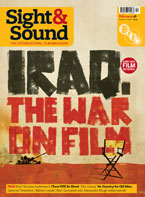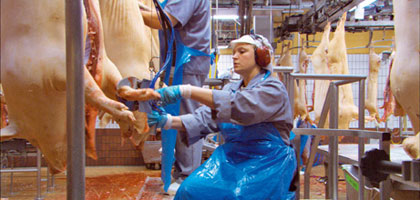Primary navigation

Austria/Germany 2005

Reviewed by Kieron Corless
Our synopses give away the plot in full, including surprise twists.
A documentary about the agricultural industry in Europe, showing the highly mechanised industrial techniques used in farms and food-processing plants in various countries across the continent, by way of segments that focus in turn on fruit and vegetable growing, salt mining, battery farming of chickens, pig castration, the slaughtering and gutting of pigs and cows, arable farming and artificial insemination, amongst numerous other activities. There is no voiceover commentary, interviews or music, just incidental sound with occasional snatches of barely audible dialogue; we see the predominantly indoor spaces in which animals are reared and plants are grown, then processed or slaughtered and finally packaged by production-line workers in protective clothing.
The first of acclaimed Austrian documentarian Nikolaus Geyrhalter's films to be released in Britain is also his least typical. More conventional earlier works such as Pripyat and Elsewhere included interviews and character portraits; for this latest - a sobering look at today's mechanised, industrial-scale food production plants - Geyrhalter started out down the same route but quickly discarded that material, preferring a more distanced, minimal aesthetic which feels perfectly adapted to his subject-matter. As we discover, Europe's giant food-processing plants seem straight out of some Kubrickian dystopia: vast, symmetrical, impersonal spaces, purpose-built to sustain the voracious systematic processes whereby the food we eat is reared and grown, harvested and slaughtered, and finally packaged for sale.
Geyrhalter's film is kin to Workingman's Death, the 2005 film by Michael Glawogger (another of the current crop of dazzling Austrian documentary film-makers unaccountably overlooked by British distributors), in its immersive focus on people at work, its reluctance to editorialise and its often mesmerising rhythms and imagery. Unlike the Glawogger film though, the spaces here are tellingly anonymous and interchangeable, like that other globalised phenomenon, the shopping malls depicted in Jem Cohen's Chain (2004), where individuality and locality can feel as if they've been obliterated. On the evidence here, the food factories are the malls' dark twin, home to the stuff we'd rather not think about when we sit down to eat; the super-efficient, state-of-the-art killing machine necessary to sustain, but equally concealed by, the bright lights of mass consumerist spectacle.
Nevertheless, and notwithstanding the next line of the Lord's Prayer ("and forgive us our trespasses") from which the title is lifted, it's difficult to discern any explicitly political or moralising stance in Our Daily Bread's calculatedly dispassionate gaze, although arguably that silent refusal can be read as eloquent. But what Geyrhalter chooses to show is certainly suggestive, and often implicitly critical, like the crop-dusting plane that suddenly disrupts the summer tranquillity of a field full of flowers, spraying them with pesticide. The film's calm, deliberately monotonous rhythms constructed through long takes (edited by regular collaborator Wolfgang Widerhofer with an eye for incisive juxtapositions and subtly disjunctive sound-image mixes) encourage an active, engaged viewer, while Geyrhalter's striking compositions are often a discomfiting mix of alien, even awful strangeness and spellbinding beauty, giving them a pronounced charge which to some extent shields them from accusations of aestheticisation.
There are also occasional moments of grim absurdist comedy, as when hundreds and hundreds of newly hatched yellow chicks are propelled like tennis balls out of chutes and into crates, and not unlike the startled chicks themselves you're not really sure why it's happening or what's going on. Then there's the worker in protective headgear whose job consists of repeatedly slicing the feet off dead chickens, about as weird and wretched an image of regimented, alienated labour as Marx could have hatched in his worst nightmares - although that point of view is complicated by Geyrhalter punctuating the flow of production-line imagery with shots of workers eating lunch and chatting, or quietly reflecting alone on who knows what, providing not only a necessary break for the viewer as well from the relentlessness of the process, but also showing the workers as far from dehumanised, as ordinary people doing a job.
Elsewhere too things are rarely straightforward. The undoubtedly swift and therefore 'humane' slaughtering of animals can seem just the reverse when raised to the pitch and intensity dwelt upon here, and when they're instantly hung up on hooks and sliced open bit by bit by lethal machines within seconds of dying. Yet the farming system's gargantuan scale and inhuman efficiency does incite some form of grudging acknowledgement, especially given that we all to varying degrees rely on it and are therefore implicated in its ethical standards; and it's that subtle eliciting of shaded, even contradictory responses, its stringent open-endedness as much as the meticulously double-edged compositions, that are the source of Our Daily Bread's lingering, unsettling effects.